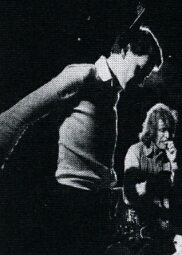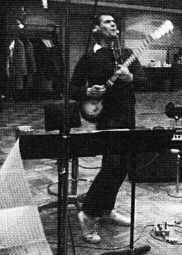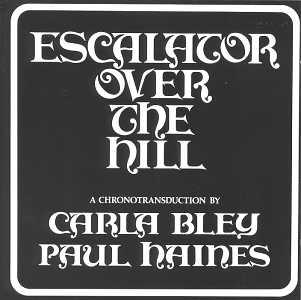
|
Escalator
Over
The
Hill
|

|
| Tracklist |
Releases |
Reviews |
-
Hotel Overture (Bley/Haines)
- 13:12
-
This Is Here.... (Bley/Haines)
- 6:02
-
Like Animals (Bley/Haines)
- 1:21
-
Escalator over the Hill
(Bley/Haines) - 4:57
-
Stay Awake (Bley/Haines)
- 1:31
-
Ginger and David (Bley/Haines)
- 1:39
-
Song to Anything That Moves
(Bley/Haines) - 2:22
-
Eoth Theme (Bley/Haines)
- 0:35
-
Businessmen (Bley/Haines)
- 5:38
-
Ginger and David Theme
(Bley/Haines) - 0:57
-
Why (Bley/Haines)
- 2:19
-
It's Not What You Do
(Bley/Haines) - 0:17
-
Detective Writer Daughter
(Bley/Haines) - 3:16
-
Doctor Why (Bley/Haines)
- 1:28
-
Slow Dance (Bley/Haines)
- 1:50
-
Smalltown Agonist (Bley/Haines)
- 5:24
-
End of Head (Bley/Haines)
- 0:38
-
Over Her Head (Bley/Haines)
- 2:38
-
Little Pony Soldier (Bley/Haines)
- 4:36
-
Oh Say Can You Do? (Bley/Haines)
- 1:11
-
Holiday in Risk (Bley/Haines)
- 3:10
-
Holiday in Risk Theme
(Bley/Haines) - 0:52
-
A.I.R. (Bley/Haines)
- 3:58
-
Rawalpindi Blues (Bley/Haines)
- 12:44
-
End of Rawalpindi (Bley/Haines)
- 9:40
-
End of Animals (Bley/Haines)
- 1:26
-
.......And It's Again
(Bley/Haines) - 27:17
|
 |
Releases
1990 CD ECM 839310-2
1974 LP JCOA 10034/5
CD ECM 839310
1990 CD Polygram 839310
2000 CD ECM 839310
Reviews
AMG EXPERT REVIEW: At the time, this was probably
the longest jazz-generated work in existence (its length has since been
exceeded by recent pieces like Wynton Marsalis' Blood On the Fields), a
massive, messy, all-encompassing, all-star ego trip that nevertheless gave
Carla Bley an immense cachet of good will among the avant-garde. Bley and
librettist Paul Haines called it a "chronotransduction," whatever that
means. The critics called it a jazz opera -- which it isn't. Escalator
is, however, very much of its time, a late-'60s attempt to let a thousand
flowers bloom and indulge in every trendy influence that Bley could conceive.
There is rock music, early synthesizer and ring modulator experiments,
the obligatory Indian section, repeated outbreaks of Weimar Republic cabaret
in 3/4 time that both mock and revere European tradition. The incomprehensible
"libretto" and a good deal of the lugubrious writing for big band amount
to a textbook of avant-garde pretension. And yet sometimes this unwieldy
hash pulls itself together -- the woolly, somber, sectional "Hotel Overture"
with avant-squeal solos from clarinetist Perry Robinson and the young Gato
Barbieri in all his Wild Bull of the Pampas glory, the clear voice of Linda
Ronstadt brightening up a song called "Why," Don Cherry's clarion trumpet
work, the power trio of John McLaughlin, Jack Bruce and Paul Motian rumbling
energetically away amidst the Indian structures of "Rawalpindi Blues."
Originally released on three LPs, an almost unheard-of extravagance in
1971, today this giant relic fits comfortably on two CDs. Yet the hard-to-find
LP version does have an advantage, for the work concludes with an endless
windy drone via one of those locked run-out grooves, an effect that obviously
cannot be transferred to a CD, which shuts off automatically. -- Richard
S. Ginell
Despite being widely recognized as one jazz's most ambitious
projects, Carla Bley's massive "chronotransduction" Escalator Over The
Hill had never been performed live until 1997, when it was staged in Cologne
with an almost entirely new cast. It worked so well at that show that it
tours europe this Summer. To celebrate this, ECM sister label Jazz Composers'
Orchestra Association is re-issuing the orginal, recorded between 1968
and 71, as a special CD package. It remains a remarkable work, melding
jazz, operas, rock, songwriting and big band composition. Its vast cast
included Jack Bruce, Gato Barbieri, Don Cherry, Charlie Haden, John McLaughlin,
Paul Motian, Linda Ronstadt, Dewey Redman, Jimmy Lyons, Enrico Rava, Michael
Mantler... and on and on. Yes, this kind of massive, cross-cultural experiment
can have all the wrong connotations, but don't let expectations brought
on by less genuinely ambitious projects put you off. Escalator is certainly
overwrought, but it's its own world, and unsurpassed almost three decades
on.
Sure it's a big sprawling mess but it was still practically
the '60s, man, and this is the art of letting it all hang out lifted to
a conceptual peak. Lotsa guest
stars, including Jack Bruce, John McLaughlin and Linda
Ronstadt (huh?). Libretto by Paul Haines.
This review was written by Richard_C_Walls who
gave this album a rating of 90.
Con
The triple album that has been on my shelves for almost
thirty years was quietly gathering dust, forgotten after having fascinated
me for so long. ECM decided to re-release it as a double CD. I must admit
I'm disappointed. OK, Carla Bley is a composer whose place in jazz history
is assured, and "Escalator Over the Hill" is a highly original opera -
sorry, chronotransduction - with words by Paul Haines. To mention just
a few participants, there are Gato Barbieri, with his fiery tenor, Roswell
Rudd with his startling cries, and Don Cherry with his tragic sound. But
this pastiche of genres - progressive rock, free and not-so-free jazz,
film music, Hindu influences - seems not to have aged very well at all.
Bley says she wanted to compose the "Sgt. Pepper's" of jazz, but "Sgt.
Pepper's" doesn't sound so dated. However, in a time when so many independent
labels are struggling to survive, we should remember that Carla Bley was
a founding member of the Jazz Composers' Orchestra, then the Jazz Composers'
Orchestra Association, which produced this record. The opera was never
given in public, until its first performance in 1997 in Cologne, and then
twenty stops this summer, with a new line-up. Our correspondent Vincent
Domeyne was knocked out by what he saw in Vienne.
In 1973, Bley and her companion, Austrian trumpeter Michael
Mantler, decided to found their own label, Watt Works. Their first release,
"Tropic Appetites," came out in 1974. It can be heard as an extension of
"Escalator," with words by Paul Haines once again. This one seems to have
whethered the storms of time more easily. Some of the musicians were on
the previous work, but here we also have the suave Julie Tippets, Dave
Holland and Toni Marcus. Less ambitious but more varied, "Tropic Appetites"
has survived better than its predecessor. [ALR]
Pro
By the end of the 60's, Carla had already seen the future.
The magnificent young musician with the hippie look settled down to years
of work on her singular, modern music. In 1968, Carla chose musicians who
would make a difference to the history of jazz, who would beat an honest,
new path for jazz to continue to renew itself: Howard Johnson, Paul Motian,
Dave Holland, Enrico Rava, Charlie Haden, Jimmy Knepper, Don Cherry, Jack
Bruce, Jimmy Lyons, John McLaughlin, Chris Woods, Dewey Redman, Sharon
Freeman, Ron McClure.
In 1968, Carla had already understood that free jazz was
all washed up. She found a way to adapt open orchestral writing, improvisation
and the inspiration of soloists. In 1968, thirty years before the world
music trend, Carla realized that the music of the world could enrich her
own, that Fellini-esque Italian brass bands could be blended with Hindu
music.
In 1968, Carla was the precursor of rock operas ("Tommy")
and for the entire fusion movement. In 1968, Carla brought in Gato Barbieri,
at a peak of inspiration. Gato inspired the composer and was the guiding
light of these two albums. [SK]



